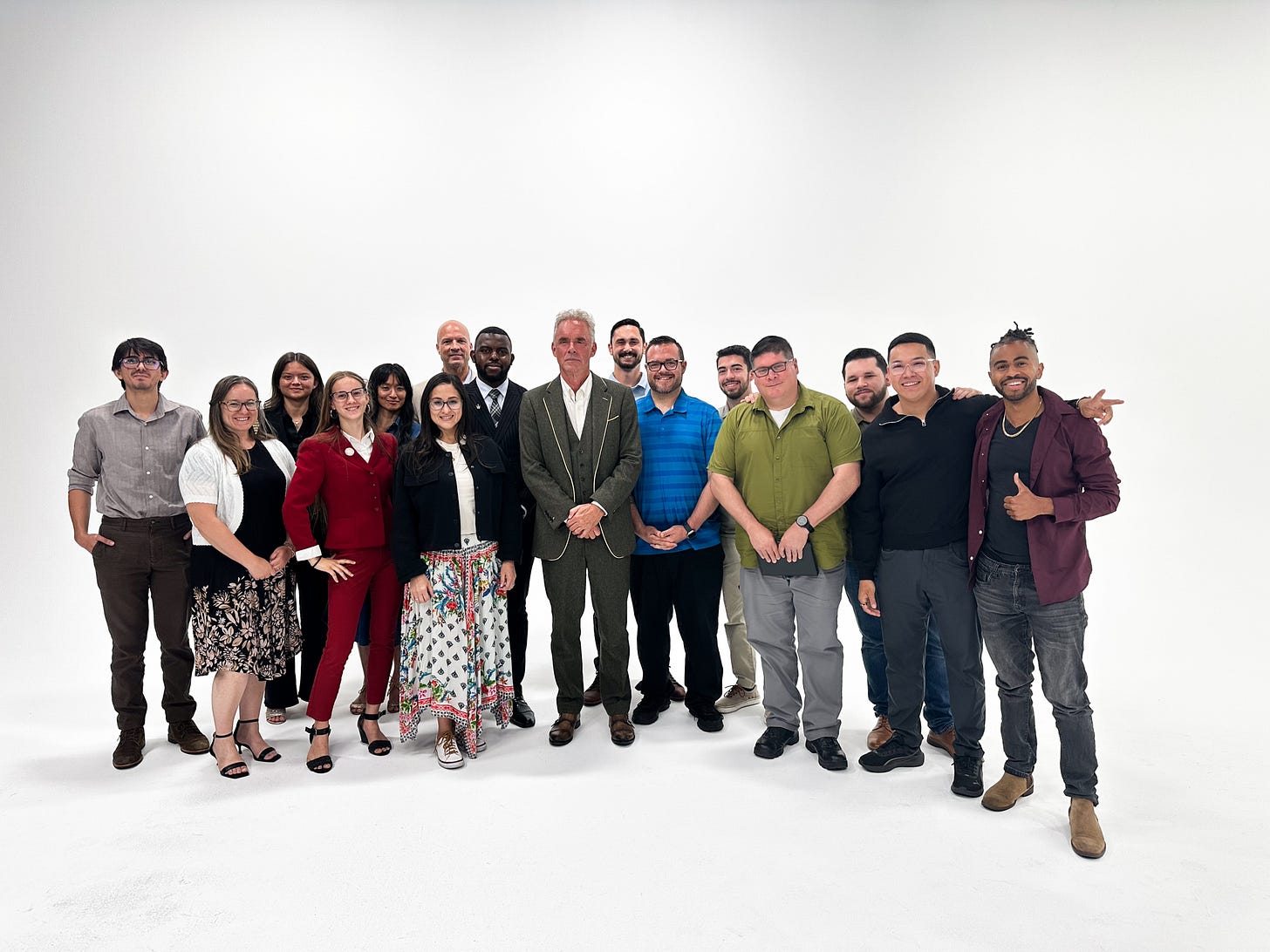My Conversation with Jordan Peterson
In the arena of ideas with one of the internet's favorite intellectuals
Last week, I was invited to bat ideas with Jordan Peterson.
A small group of us sat with the former Harvard and University of Toronto professor as he unravelled decades of thinking into a special 8 hour course for the Peterson Academy.
Now, for those who don’t know, Jordan Peterson has been one of the more polarizing figures in the global culture arena for almost a decade. Since 2016, he’s become a figure that people either unequivocally hate or unconditionally love. To the internet, he’s either a mean and petulant patriarch or the persecuted prophet of moral and principle in a world going to hell.
Obviously, he is much more than a one dimensional alliteration but we’re not here today to discuss whether or not you should like him. In this article, I’m here to discuss something a bit trickier: how the same thing that draws me to Peterson - his conviction - is the same thing that gives me pause, and how I confronted him about it one fateful day in Scottsdale, Arizona.
The Infectiousness of the Unconflicted Man
One of my favorite ideas is that of “The Infectiousness of the Unconflicted Man”. It’s the observation that in a world where so many people are fraught with doubt, the person who acts and speaks with unwavering clarity becomes a magnet. Their unconflicted confidence is a lifeboat for the people who were otherwise drowning in the gray area, waiting on a revelation to show them the way. The person who seems so sure of themselves becomes an antidote for our own limiting beliefs and to them we cast our alliance and our hopes time and time again.
This is a phenomenon we’ve seen manifest in movements behind figures from Martin Luther King to Adolf Hitler. When someone gets on a stage and proclaims with unwavering clarity, people who were otherwise unsure or had reservations, all of a sudden become enamored by the ideas and the energy of the person who doesn’t suffer the same confusion. Jordan Peterson is arguably the epitome of someone who speaks with this unconflicted conviction.
But, this phenomenon has two sides.
The Power of Being Unconflicted
I remember the first time a friend sent me a Jordan Peterson video I was captured by the courage I witnessed as he stood down attack after attack that attempted to sow doubt into his ideas and instead of acquiescing to weaker arguments or getting angry defending his, he heard out his doubters and responded with a wealth of information and reasoning he had obviously spent decades acquiring. It was a battle of well researched logic vs. temporary flared emotions, a recipe for viral admiration. He would do this over and over again and each time his status as the intellectual hero of the internet would skyrocket.
I even noticed that as he delivered a hard truth that I myself believed but didn’t have the words for or the courage to deliver, his unconflicted delivery would make me feel more confident in myself.
In a world where an overwhelming majority of people don’t say (or know) what they mean when it comes to anything from social issues to their own relationships, having someone step forward with clarity is the exhale from a breath you didn’t even know you were holding. A tension is relieved and a path forward is paved. There’s a reason why we feel a sense of relief when someone says what we were thinking either because they had the words or the willingness to take the bullet.
Jordan, whether you like him or not, has spent decades wrestling with questions most people would rather avoid—and is regularly paying the price for doing so.
But, there’s a problem.
The Problem with Being Unconflicted
For every example of the Unconflicted Man phenomenon, there are at least half as many examples of it going very wrong. (See: Hitler). Just because someone speaks with unwavering confidence doesn’t mean the words are true. But the tricky part is, unless you’ve done the work to research, chances are you’ll find yourself believing them and their ideas in direct proportion to the amount of confidence with which they deliver them.
I remember one time I went to a party in LA and overheard a conversation where one of those New Age guru bros was swearing to a small group of listeners that he had cured his cancer by drinking his own urine for a year. To my surprise, the listeners in his small crowd looked anywhere from optimistically curious to downright convinced. Now, I’m a big fan of biohacking but I’m going to go ahead and wait for the double-blind peer-reviewed study to come out on that one before I put it to the test. In a world of information overload and unconflicted influencers, it’s not only the most susceptible of us who could find ourselves down a seductive path that promises a glittery paradise. We simply don’t have the time to parse through all that is true and false in the time of the internet so we often just align with the first person to make a relatively compelling case with an unshakeable level of conviction.
And to make matters more complicated, it’s not as simple as bad man vs. good man. Sometimes people are malicious and exploiting the Infectiousness of the Unconflicted for their own benefit, but to be honest, I’ve found that most of the time, it’s just that these people found themselves in their own rabbit hole of information and are so deep in it they can’t see anything else. They’ve infected themselves with their own confidence and ideas.
And so, that’s why after years of admiring Jordan Peterson’s infectious conviction from the comfort of my living room laptop, I had to confront him in person with the one question I was afraid to ask.
My Conversation with Jordan Peterson
As we wrapped up the course, Jordan opened up the floor to questions for the dozen of us in attendance. He turned to me last.
Before I asked my question, I took a moment to acknowledge him. I looked him dead in his eyes and said thank you for taking the time to research big questions and expending the effort it takes to communicate what you find. I wanted to let him know that his work is appreciated, and his care is valuable. It takes serious investment to be that unconflicted.
And then I asked him the one question that had been sitting in my gut through the entire lecture:
“But, how do you know when you’re wrong?”
When your whole life is built around pattern recognition—when you’re constantly drawing conclusions from politics, psychology, religion, mythology—how do you know if you're seeing something true, or just seeing what you want to see? Yes, you speak with courage and conviction, but is it because you’re clear on the truth or infected by your own ideas?
I won’t lie, seeing Jordan eviscerate doubters on live TV for the last 10 years definitely had me shaking when I asked this question. I mean, one could not only interpret the question as saying he could be wrong, but that he is. Even if it wasn’t my intention, the question could be seen as trying to plant in his mind what the unconflicted man spends years of his life avoiding: doubt.
As such, I prepared myself for a complete shutdown of the question and walking away with this as my only response:
But that’s not what happened.
He didn’t flinch. He didn’t get defensive or dismissive. He just looked at me and said:
“You test.”
You test your ideas against biology. Against psychology. Against history. Against evidence.
You don’t just confirm. You pressure test with as many data-backed tools as you can possibly find. In other words, the best way to become unconflicted about your ideas is to try and self-induce conflict.
That’s how you know if what you believe is real—or just unconflicted bias.
As anyone on a growth journey can attest, once you’ve invested years of time, energy, or identity into a belief, it’s very hard to let it go. Some people would rather live the well-built lie than risk it all by pressure testing something they’ve grown accustomed to - but that’s the hallmark of someone who cares more about truth and progress than clout and comfort.
And I think the world of personal development specifically needs a strong reminder of this.
I see it all the time:
People clinging to mindset frameworks or spiritual systems that feel empowering but fall apart under scrutiny.
Coaches and influencers building brands on beliefs they’ve never actually tested—because changing course would mean letting go of their identity.
Even clients of mine who know deep down that the path they’re on isn’t working but struggle to pivot because they’ve already come so far.
Everyone wants to be the unconflicted leader but no one wants to weather the storms of conflict.
That was my biggest takeaway from my little gathering with Jordan Peterson. In a world of unconflicted charlatans, follow the guidance of the people who don’t just take criticism, they welcome it. These are the people to trust as we move from confusion to clarity and from doubt to confidence. Don’t shy away from someone because they talk like they have the answers, just always make sure to do your own research.
Speaking of personal development…
We've officially entered the second half of the year which means come July 1st, I’ve got two coaching spots opening up for those who want to do the real work.
No shortcuts. No wishful thinking. Just science-backed tools and unwavering accountability to help you reach your 2025 goals. If you’re in a time of transition and you’ve been looking for purpose, clarity, and the next level of what your life can look like, now’s the time to pull the trigger. Just ask one of my clients from the first half of the year, Vadim:
If you're building something big—or becoming someone deeper—and want a partner who will challenge your doubts (and your convictions) along the way, let’s chat
- Imari






